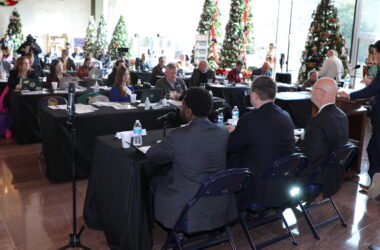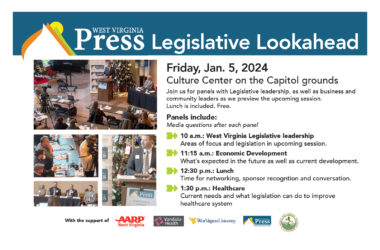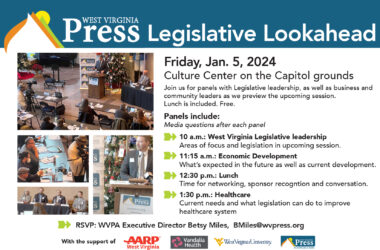WASHINGTON, D.C. – Sen. Jay Rockefeller, D-W.Va., chairman of the Senate Committee on Commerce, Science, and Transportation, is working to make sure communications systems keep West Virginians safe and connected during emergencies like the 2012 derecho.
Rockefeller this week sent a letter to the Government Accountability Office (GAO) which requested a study on how the communications sector will guarantee the resiliency and reliability of the nation’s communications networks as they transition to more advanced technologies. The Senator is also pledging to make sure consumers are protected during the transition, and that their access to emergency communications services is not compromised.
Specifically, Rockefeller asked GAO to study how the nation’s communications networks – which continue to transition to an Internet Protocol (IP) environment – can be rapidly restored after a natural or man-made disaster. He sent the letter along with Senator Mark Pryor (D-AR), chairman of the Subcommittee on Communications, Internet and Technology, and Senator Bill Nelson (D-FL), chairman of the Subcommittee on Science and Space.
“During times of emergencies, effective communications before, during, and after the incident can drastically alter the outcome of that incident. Yet, as proven during Superstorm Sandy, the Boston Marathon bombings, and other emergencies, communication networks can be brought down by congestion as friends and families flood lines in search of loved ones. Furthermore, the loss of communications facilities could have cascading impacts on other key critical infrastructure sectors due to interdependencies between the sectors,” the Senators wrote in the letter.“Therefore it is important that the nation’s communications networks and systems are resilient and rapidly restored after a natural or man-made disaster. We are interested in knowing how the communications sector will ensure the reliability of the nation’s communications networks in an IP-environment.”
Following the Senators’ letter, the Commerce Committee’s Subcommittee on Communications, Internet and Technology today held a hearing examining the public safety implications of the nation’s evolving communications networks and how best to preserve consumer access to those networks while providing life-saving information during and after emergencies. In a statement for the record, Rockefeller noted the importance of making sure new networks provide consumers with the same level of service and reliability.
Background:
For many Americans, voice communications technology is transitioning from copper to fiber-based transmission, circuit switched to IP-based protocols, and wired to wireless communications. These “technology transitions” promise to revolutionize the way we communicate. But, as the nation’s networks continue to evolve from these legacy systems to all IP networks, it is critical to have a better understanding of their functionality, especially in times of natural or man-made emergency.
Rockefeller’s prepared remarks for the hearing are included below.
Statement for the Record – Senator John D. (Jay) Rockefeller IV, Chairman
Subcommittee on Communications, Technology and the Internet
Hearing on the “Preserving Public Safety and Network Reliability in the IP Transition”
June 5, 2014
Public safety has been a key part of communications policy since the passage of the Communications Act over 80 years ago. And this commitment to public safety and network reliability must remain paramount no matter what makes up the underlying architecture or technology of our communications networks. We know our Nation’s communications are evolving, and I am optimistic about the future, but let me be clear: during this transition, we must make sure that consumer protections are not reduced in any way. Whether young or old, rich or poor, urban or rural, no consumer should be left behind by changing technology.
As the nation moves away from traditional copper-based architectures and circuit-switched technologies, we must understand how new technologies and services will perform in disaster and emergency situations. For public safety, the migration to next generation technologies and protocols brings new communications capabilities, improvements in network redundancy, targeted public safety alerts, and greater monitoring for problems in the network. It is also true that no technology is immune to the impacts of disaster. I saw this firsthand when the derecho wreaked havoc on communications networks in West Virginia two years ago. But given that hundreds of millions of calls are made to 9-1-1 each year, there must be a renewed focus on making sure that communications networks are ready when disaster strikes.
That renewed focus must carry over into the FCC’s thinking about the evolution of our nation’s communications networks. If conducted carefully and transparently, the FCC’s planned IP transition trials will help the nation understand the true impact of the IP transition on public safety and consumers. I support the FCC’s deliberate approach to these trials, and its efforts to make sure that the new networks provide the same level of service and reliability as the old.
Similarly, we cannot forget that state regulators play an important and essential role in overseeing the functioning of communications networks. The Communications Act enshrined a system of dual authority that recognized that state regulators are often “on the ground” and know better than Washington whether communications companies are living up to their commitments to consumers and public safety in their state. I believe this robust regulatory system should be preserved in the transition.
I want to thank Senator Pryor for holding this important and timely hearing, and I look forward to the testimony from our witnesses and to their perspectives on preserving public safety and network reliability with the IP transition.




